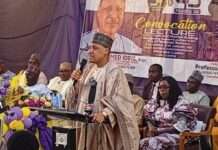

By Seun Ibiyemi
Nigeria is moving decisively towards economic transformation through its marine and blue economy, following the recent approval of a landmark national policy aimed at unlocking the full potential of the nation’s coastal and aquatic resources.
Minister of Marine and Blue Economy, Adegboyega Oyetola, reaffirmed the government’s resolve during a meeting with a World Bank delegation at the Ministry’s headquarters in Abuja.
Describing the sector as a “catalyst for sustainable national economic growth,” Oyetola said Nigeria is “on the right course to tapping the vast economic opportunities offered by its oceans, seas, rivers, and coastal assets.”
He noted that the newly approved National Policy on Marine and Blue Economy marks Nigeria’s first all-encompassing roadmap for the responsible management of its marine wealth.
“This policy is historic. It provides a coherent framework for sustainable utilisation, conservation, and governance of our marine resources. It will drive wealth creation, boost job opportunities, strengthen food security, and position Nigeria as a leader in Africa’s fast-emerging blue economy space,” Oyetola stated.
A key pillar of the policy is cutting Nigeria’s dependence on fish imports. The Minister disclosed that government is expanding local fish production through targeted support for aquaculture, artisanal fishing, and fish farming clusters.
“We cannot continue to import what we have the capacity to produce locally,” he remarked, stressing the potential to create thousands of jobs, especially in coastal and riverine communities.
Oyetola also underlined the importance of inclusive development, pointing to initiatives that will expand opportunities for youth and women within the sector.
“This is not solely about economic expansion; it is about social empowerment and fair growth,” he said.
Responding, World Bank representative Mrs Gladys Fajomu praised Oyetola’s leadership and pledged sustained backing through technical support, capacity building, and financing for high-impact projects.
Her team also held discussions with ministry officials to identify priority areas for collaboration, particularly in policy implementation, infrastructure development, and engagement with the private sector.
With a clear national strategy, strong international alliances, and a robust policy framework, Nigeria’s marine and blue economy is positioned to become a central driver of economic diversification, environmental stewardship, and inclusive progress.







